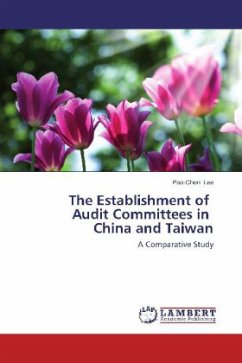
Freedom of Establishment versus Creditor Risk in Germany: A Clash of Principles?
Versandkostenfrei!
Versandfertig in 1-2 Wochen
38,00 €
inkl. MwSt.

PAYBACK Punkte
0 °P sammeln!
Master's Thesis from the year 2005 in the subject Business economics - Law, grade: 1,5, Anglia Ruskin University (Faculty of Arts, Law and Social Sciences, Studiengang L.L.M. International and European Business Law), language: English, abstract: Inhaltsangabe:Abstract:The aim of this dissertation is to analyse the potential clash of the principle of free establishment and the creditor protection principles in Germany. It researches the position of unsecured creditors of insolvent pseudo-foreign companies following the rulings of the European Court of Justice in Segers, Centros, Überseering an...
Master's Thesis from the year 2005 in the subject Business economics - Law, grade: 1,5, Anglia Ruskin University (Faculty of Arts, Law and Social Sciences, Studiengang L.L.M. International and European Business Law), language: English, abstract: Inhaltsangabe:Abstract:
The aim of this dissertation is to analyse the potential clash of the principle of free establishment and the creditor protection principles in Germany. It researches the position of unsecured creditors of insolvent pseudo-foreign companies following the rulings of the European Court of Justice in Segers, Centros, Überseering and Inspire Art with the focus on German creditors of companies with limited liability incorporated in England and Wales.
Research is carried out through reviewing and analysing academic and professional opinions voiced concerning the applicability, restricted or non-applicability of specific German creditor protection instruments following the ECJ rulings considering that the law of the country of incorporation governs foreign companies. European case law defining the current understanding of the fundamental freedom of establishment is reviewed and contrasted with subsequent rulings by German courts involving insolvent English companies.
The result of the analysis shows that the number of English limited companies (Limited) is still relatively insignificant compared to the total number of German GmbH companies. Limiteds don't seem to replace the GmbH and don't yet present a threat to the German economy. Questionable is the accuracy and completeness of company information a German creditor can obtain. The main reason is the lack of a formalized or regulatory information process between the company registers of England and Germany.
Based on the research performed it can be concluded that the principles of creditor protection in Germany differ greatly from those applied in England. The German creditors can no longer rely on the applicability of German creditor protection instruments and face legal uncertainties. In Germany the majority of creditor protection instruments are part of company law, in England they are part of insolvency laws. The European Insolvency Regulation is not specific enough to solve these uncertainties and can even aid forum shopping. Until further clarifications are provided by the ECJ through appropriate case law the situation will remain highly unsatisfactory for the German creditor.
Inhaltsverzeichnis:Table of Contents:
Introduction1
Literature Review12
Freedom of Establishment - Articles 43 and 48 EC12
German Creditor Protection and Articles 43 and 48 EC16
I.Duty to file insolvency proceedings21
II.Equity Capital Maintenance and Replacement25
III.Destroying a company's existence29
Methods and Methodologies34
I.Research Methods35
II.Theoretical Orientations in Qualitative Research37
III.Research Styles40
IV.Data Collection Methods42
V.Actual Data Sources44
Principles, Conflict, Theory47
Right of Establishment within Europe47
Principles of Creditor Protection52
I.Director Statutes55
II.Shareholder Statutes60
European Insolvency Regulation65
Relevant Case Law68
European Court of Justice68
I.Segers Case C-79/85 [1986]70
II.Centros Case C-212/97 [1999]71
III.Überseering Case C-208/00 [2002]72
IV.Inspire Art Case C-67/01 [2003]74
German Courts76
I.LG Stuttgart 5 KfH O 76/01 10.8.200177
II.AG Hamburg 67g IN 358/02 14.5.200378
III.LG Hannover 20 T 39/032.7.200379
IV.AG Duisburg 63 IN 48/03 14.10.200380
V.LG Berlin 102 T 57/0431.8.200481
VI.AG Saarbrücken 106 IN 3/05 25.2.200582
VII.BGH Case II ZR 5/03 14.3.2005(LG Hagen)83
VIII.AG Bad Segeberg 17 C 289/04 - 24.3.200584
Creditor Risks - real or illusory90
The Informed Creditor90
I.Acce...
The aim of this dissertation is to analyse the potential clash of the principle of free establishment and the creditor protection principles in Germany. It researches the position of unsecured creditors of insolvent pseudo-foreign companies following the rulings of the European Court of Justice in Segers, Centros, Überseering and Inspire Art with the focus on German creditors of companies with limited liability incorporated in England and Wales.
Research is carried out through reviewing and analysing academic and professional opinions voiced concerning the applicability, restricted or non-applicability of specific German creditor protection instruments following the ECJ rulings considering that the law of the country of incorporation governs foreign companies. European case law defining the current understanding of the fundamental freedom of establishment is reviewed and contrasted with subsequent rulings by German courts involving insolvent English companies.
The result of the analysis shows that the number of English limited companies (Limited) is still relatively insignificant compared to the total number of German GmbH companies. Limiteds don't seem to replace the GmbH and don't yet present a threat to the German economy. Questionable is the accuracy and completeness of company information a German creditor can obtain. The main reason is the lack of a formalized or regulatory information process between the company registers of England and Germany.
Based on the research performed it can be concluded that the principles of creditor protection in Germany differ greatly from those applied in England. The German creditors can no longer rely on the applicability of German creditor protection instruments and face legal uncertainties. In Germany the majority of creditor protection instruments are part of company law, in England they are part of insolvency laws. The European Insolvency Regulation is not specific enough to solve these uncertainties and can even aid forum shopping. Until further clarifications are provided by the ECJ through appropriate case law the situation will remain highly unsatisfactory for the German creditor.
Inhaltsverzeichnis:Table of Contents:
Introduction1
Literature Review12
Freedom of Establishment - Articles 43 and 48 EC12
German Creditor Protection and Articles 43 and 48 EC16
I.Duty to file insolvency proceedings21
II.Equity Capital Maintenance and Replacement25
III.Destroying a company's existence29
Methods and Methodologies34
I.Research Methods35
II.Theoretical Orientations in Qualitative Research37
III.Research Styles40
IV.Data Collection Methods42
V.Actual Data Sources44
Principles, Conflict, Theory47
Right of Establishment within Europe47
Principles of Creditor Protection52
I.Director Statutes55
II.Shareholder Statutes60
European Insolvency Regulation65
Relevant Case Law68
European Court of Justice68
I.Segers Case C-79/85 [1986]70
II.Centros Case C-212/97 [1999]71
III.Überseering Case C-208/00 [2002]72
IV.Inspire Art Case C-67/01 [2003]74
German Courts76
I.LG Stuttgart 5 KfH O 76/01 10.8.200177
II.AG Hamburg 67g IN 358/02 14.5.200378
III.LG Hannover 20 T 39/032.7.200379
IV.AG Duisburg 63 IN 48/03 14.10.200380
V.LG Berlin 102 T 57/0431.8.200481
VI.AG Saarbrücken 106 IN 3/05 25.2.200582
VII.BGH Case II ZR 5/03 14.3.2005(LG Hagen)83
VIII.AG Bad Segeberg 17 C 289/04 - 24.3.200584
Creditor Risks - real or illusory90
The Informed Creditor90
I.Acce...














